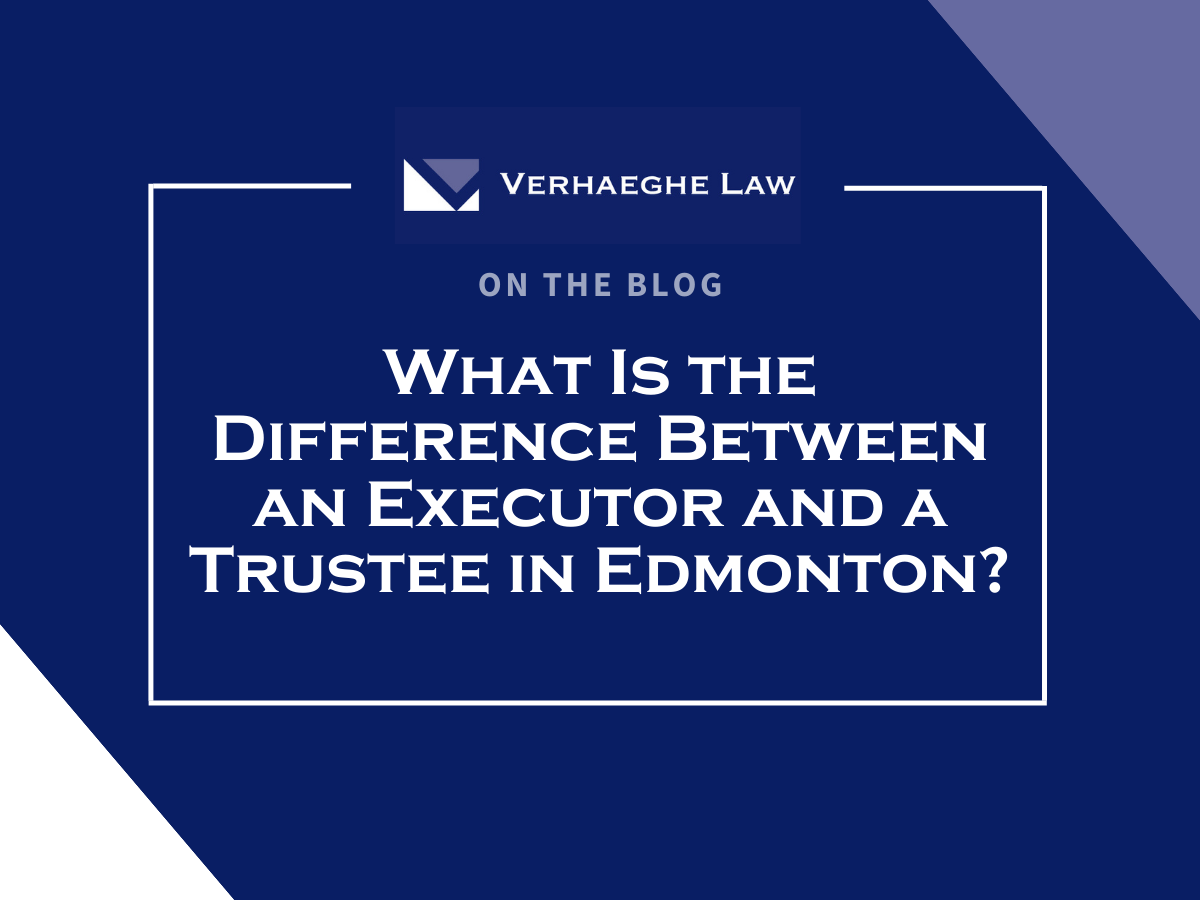What Is the Difference Between an Executor and a Trustee in Edmonton?

Executors and trustees both play key roles in the administration of an estate after a person passes away. Both act in the interests of the estate’s beneficiaries, and may share certain tasks. In fact, one person may fulfill both roles. However, there are key differences that distinguish an executor from an estate trustee.
Estate administration can be a complicated process. If you have questions about your particular case, or would like to learn more about what course of action may be best for you, contact our Edmonton estate administration lawyers today to schedule your initial consultation.
What Is an Executor?
The executor of an estate (also known as a personal representative) is a person, usually appointed in the last will and testament of the deceased, who is responsible for administering the estate according to the deceased’s wishes.
Often, an executor’s administration process begins with applying for a grant of probate. This is a legal document that gives the executor the legal right to distribute the estate. In some cases, if the estate is small and the distribution requirements are simple, a grant of probate may not be necessary.
An executor’s main responsibility is to settle the deceased’s estate. This involves locating all the properties of the deceased, and determining any taxes, debts, or other liabilities the deceased had. This will influence the net value of the estate. The executor is then responsible for distributing the estate according to the deceased’s wishes.
In addition to distributing the estate, an executor may be responsible for arranging the funeral, and notifying family members, public officials, employers, friends, and any other relevant parties about the death.
If there are trusts involved in the estate of the deceased, the executor communicates with the trustees in order to ensure they are performing their responsibilities.
What Is an Estate Trustee?
While an estate executor manages the overall assets and properties of the deceased, an estate trustee is responsible only for the matters they have been specifically designated to oversee. The trustee manages property on behalf of beneficiaries of a trust created by the deceased.
A person may create a trust for many different reasons. A parent, for instance, may choose to create a trust for their children, to keep property aside until they reach a certain age. The trustee owns that property for the time being, with the responsibility of acting in the best interests of the trust’s beneficiaries. When the children reach the designated age, the trustee passes the property to them, and the trust is closed.
Some trusts are structured to provide ongoing financial support, and may require a trustee’s long-term commitment. For example, if there is a family member who is unable to manage their own financial affairs, a trustee may distribute regular portions of the trust assets over the course of a long time.
Key Differences Between the Roles of an Executor and a Trustee in Edmonton
The key difference between the roles of an executor and a trustee in Edmonton is that each is responsible for a different scope of estate matters. While the executor or personal representative manages the entire estate, it is the trustee’s job to oversee only the property that falls under the purview of their trust.
Likewise, the timelines of both roles differ. An executor is typically finished with their work once they have distributed the estate to the beneficiaries and/or to trustees as designated in the will. The work of a trustee, meanwhile, is not complete until the trust ends.
Wondering what are the roles and responsibilities of an estate trustee? Looking to discuss how to navigate these roles in your own estate administration plans? Contact our Edmonton estate administration lawyers today to set up your consultation.
Contact Our Edmonton Estate Administration Lawyers Today for a Consultation
Estate planning and administration can be challenging, but with the assistance of a dedicated professional, you may find support and clarity in the process. At Verhaeghe Law, our Edmonton estate administration lawyers are here to discuss your particular circumstances, and see how we may be of greatest help to you and your family. Contact us today to schedule your initial consultation.
** Please note, this article is intended as a general overview on the subject of estate administration law, and is not intended to be legal advice. If you are seeking legal advice, please consult with an Alberta estate administration lawyer.
